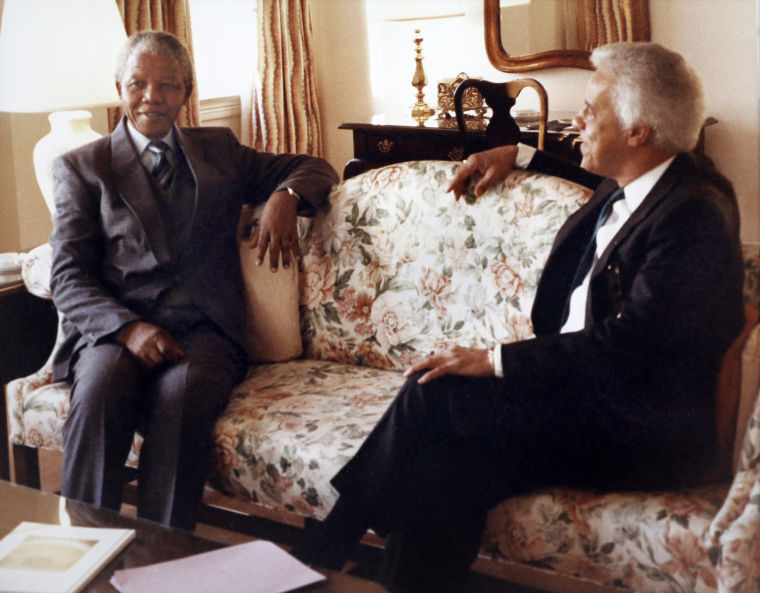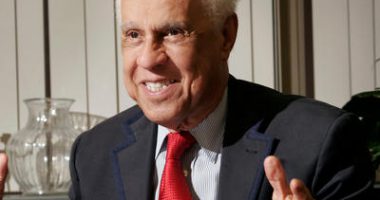 Virginians know how to demand liberty’s dissemination. The citizens of this commonwealth who have sown such powerful seeds range from Patrick Henry and Thomas Jefferson to Oliver Hill and Spotswood Robinson. Residents of this state know how to make our voices heard, and how to turn one generation’s radical ideas about freedom into the next generation’s everyday routine. The American Experiment was born with no small effort from Virginia’s practitioners.
Virginians know how to demand liberty’s dissemination. The citizens of this commonwealth who have sown such powerful seeds range from Patrick Henry and Thomas Jefferson to Oliver Hill and Spotswood Robinson. Residents of this state know how to make our voices heard, and how to turn one generation’s radical ideas about freedom into the next generation’s everyday routine. The American Experiment was born with no small effort from Virginia’s practitioners.
It is through that prism I always have viewed Nelson Mandela of South Africa. He would fit quite comfortably at a table discussing such a subject with the greatest Virginians. He knew not only how to demand liberty with eloquence, but he also knew equally well how to make it turn into a reality. Not many are born with the talent to do both — Mandela was. He was a giant among men.
I feel a great personal loss with his passing. He was someone I was able to know, as well as to watch transcend the borders of his home country. Mandela stood as an international symbol of mankind’s potential for strength and dignity. We are poorer for his departure, but richer because of the life and example he has left behind.
When I was governor of the commonwealth, I invited a group of Virginia businesspersons to accompany me on a trade-and-tourism promotion mission in Africa. We visited seven countries — with South Africa being the last stop on our trip. That was not a mistake.
Even before my visit and prior to Mr. Mandela’s release from prison in February 1990, I was imbued with the need to show support for the efforts of those South Africans struggling against apartheid. To do so, as governor, I initiated the process by which the commonwealth disinvested in South Africa by all means possible.
I wanted those in South Africa — be they pro- or anti-apartheid — to know the world had changed, and that Virginia would show the leadership necessary to cut any economic strings we may have tied that might unintentionally prolong that nation’s pernicious version of its American cousin, segregation. We were the first U.S. state to take that action.
When our group from Virginia made it to South Africa, future president Mandela was most appreciative of what Virginia had done. While our group stayed in the country, he expressed his gratitude for Virginia’s actions at every opportunity we had to get together.
Virginia cutting economic ties with South Africa at that moment in time made such a difference because of the commonwealth’s not-always-exemplary history of respecting the liberty of its citizens of African descent. With that action, we showed the progress this state, and by the reflection the American South, had made — and demonstrated a different path was possible. Was it the defining factor in bringing about change in South Africa? No, it was not. Was it something we had a responsibility to do because of the past this commonwealth lived through and the future we wanted to build? Yes, it was. We should all stand proud of making the decision to be by Mandela side.
Twenty years later, we now reflect on that great man’s journey in the hours after his loss. Mandela’s void will be difficult to fill. His loss will be felt by all, and not just those in his native South Africa. His steadying moral compass was a guiding light for many, on the African continent and beyond.
Mandela wore his measured and strict sobriety as an irremovable cloak and it covered his actions. He maintained dignity and respect even for those with whom he had the strongest reasons for disagreement. He did not ever allow himself to surrender to the trap of hating one’s enemies. He always stayed focused on building and improving and strengthening his people — those who dreamed of a new day after his release from political imprisonment and those who had locked the doors of his cell. His goal inalterably was for a better, reformed South Africa, solely and completely, with no jealous eye toward vengeful retribution.
I would hope that rather than mourn his passing, we will seek to emulate his strength of character. That is the proper tribute to what he has meant to those who are resolute in their pursuit of justice for all.
We have lost him in body and physical presence, but if we lose in him spirit, too, then shame on us. He left a legacy from which there is much to learn and to teach. There is still more work to be done — in his country and this country and worldwide. Let us continue his march. That should be our most fitting monument to Nelson Mandela.






